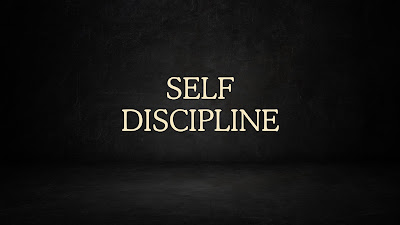In a world filled with distractions and temptations, the ability to cultivate self discipline is crucial for achieving personal and professional success. Whether you're aiming to improve your productivity, build healthy habits, or pursue long term goals, self discipline is the key that unlocks your full potential. In this blog article "How to build Self Discipline", we'll explore practical strategies to help you build and maintain self discipline in various aspects of your life.
1. Set Clear Goals: Before diving
into the journey of self discipline, it's essential to define your goals.
Clearly articulate what you want to achieve and why it matters to you. Break
down larger goals into smaller, manageable tasks, making it easier to stay
focused and motivated.
2. Create a Structured Routine: A well defined
routine provides a framework for self discipline. Establish a daily schedule
that includes dedicated time for work, relaxation, exercise, and personal
development. Consistency breeds discipline, and a structured routine helps you
stay on track.
3. Prioritize Tasks: Learn to
distinguish between urgent and important tasks. Prioritize activities that
align with your long term goals and contribute to your overall well being. This
approach ensures that you focus your energy on what truly matters, fostering a
disciplined mindset.
4. Practice Mindfulness: Cultivate
mindfulness to enhance self awareness and control over your thoughts and
actions. Being present in the moment allows you to make conscious decisions and
resist impulsive behavior. Techniques such as meditation and deep breathing can
be powerful tools in developing mindfulness.
5. Develop Healthy Habits: Habits are the
building blocks of discipline. Identify habits that align with your goals and
work on incorporating them into your daily routine. Whether it's regular
exercise, reading, or proper time management, establishing positive habits
contributes to a disciplined lifestyle.
6. Embrace Failure as a Learning Opportunity: Understand that
setbacks are a natural part of the journey toward self discipline. Instead of
viewing failures as obstacles, see them as opportunities for growth and
learning. Analyze what went wrong, adjust your approach, and use the experience
to reinforce your commitment.
7. Break Tasks into Manageable Steps: Large tasks can
be overwhelming, leading to procrastination. Break them down into smaller, more
manageable steps. Tackling one step at a time builds momentum and makes the
overall process feel less daunting.
8. Eliminate Distractions: Identify and minimize
distractions that hinder your progress. Create a focused work environment by
turning off unnecessary notifications, organizing your workspace, and setting
boundaries with social media. A distraction free environment is conducive to
maintaining self-discipline.
9. Reward Yourself: Celebrate your
achievements, no matter how small. Rewarding yourself reinforces positive
behavior and motivates you to continue practicing self-discipline. Choose
rewards that align with your goals and provide a sense of accomplishment.
10.Stay Accountable: Share your
goals with a friend, family member, or mentor who can hold you accountable.
Regular check-ins and discussions about your progress create a support system
that encourages discipline. Accountability partners can provide valuable
insights and motivation.
Conclusion
Building
self discipline is a journey that requires commitment, patience, and
self reflection. By setting clear goals, creating a structured routine, and
embracing failure as an opportunity to learn, you can develop the habits and
mindset needed to master the art of self discipline. Remember, consistency is
key, and each small step you take brings you closer to realizing your full
potential.

0 Comments
If you have any doubts, Please let me know